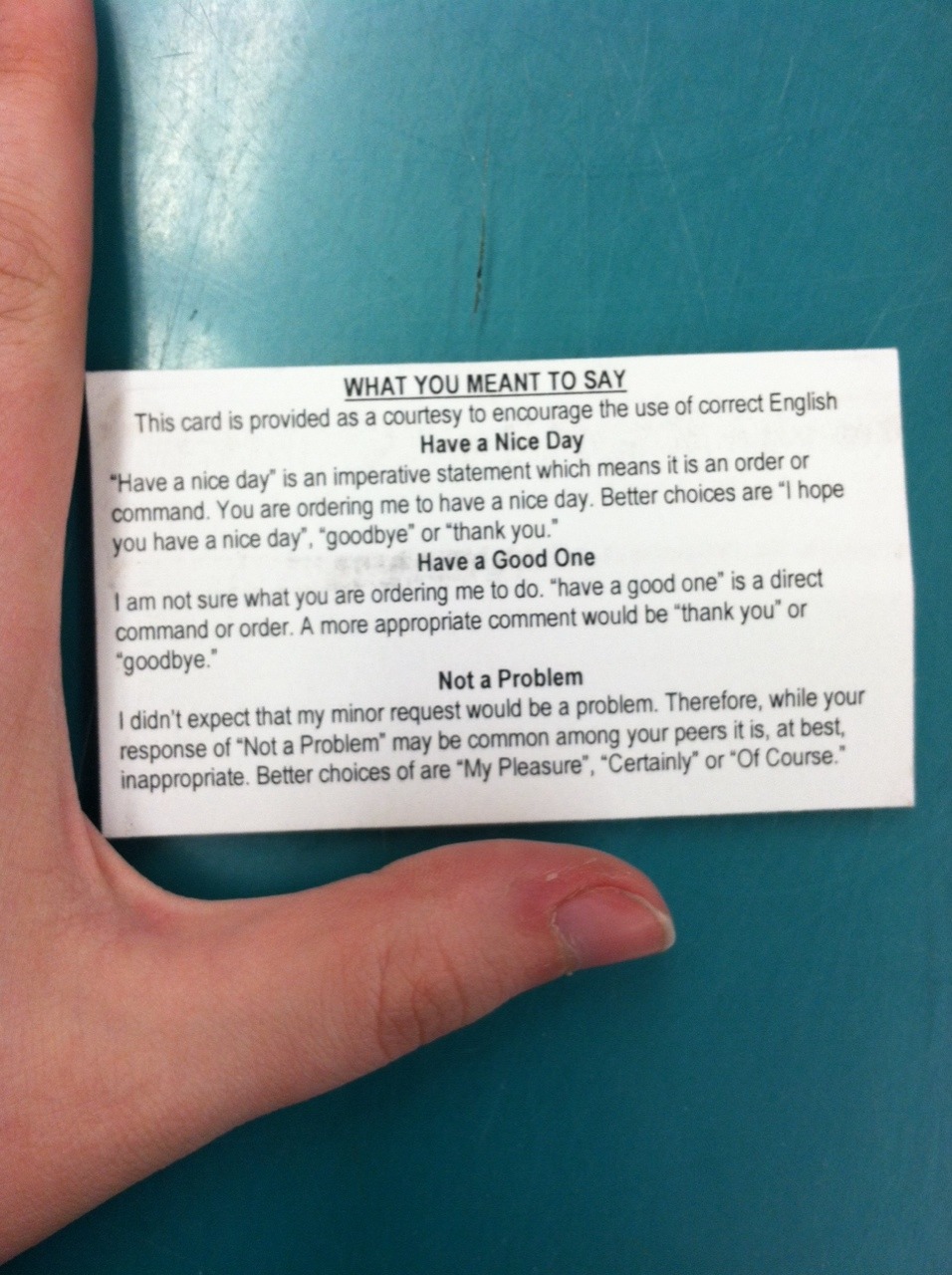whitmerule:out-there-on-the-maroon:whitmerule:out-there-on-the-maroon:hattedmistress:kenny
whitmerule: out-there-on-the-maroon: whitmerule: out-there-on-the-maroon: hattedmistress: kennyvee: bogmoth: I said “have a nice day!” to this old dude and apparently that’s not fucking good enough because he retrieved his wallet and from like a stack of 30 of these things pulled one out and gave it to me and said something like “I hope you reconsider your choices next time” “Have a nice day” is well-wishing, it’s not an order. But if you give me this card, I will order you to shove it up your ass. “Have a wonderful day!” “YOU DIDN’T SAY IT RIGHT HOW DARE YOU ORDER ME TO HAVE A GOOD DAY! Here’s a card, educate yourself!” This reminds me of when I was in middle school/high school and we’d go on field trips and go through a toll booth, and the person at the booth would tell the bus driver to “have a nice day” and after we’d driven off out of earshot this one guy would yell “Don’t tell me how to live my life!” and we’d laugh because even at the ages of like, 14 and 15 we understood that there’s a difference in meaning between telling someone what to do and saying “have a nice day!” We understood the English language better than this old dude, apparently. Hm. If you want a grammatical argument to fling back at anybody like this: In English, we lost the subjunctive mood long ago. What is a mood, you ask? Well, the indicative is one - that’s when you just observe that something is as it is - the car is red, Dean Winchester totally checked out that guy, and so on. The imperative is another mood - “Dean, check out that guy! Car, be red!” The subjunctive is another mood, expressing uncertainty, or that one thing depends on something else, mostly used to hope or pray for something. But since we don’t have it for English verbs anymore, we have to use a lot of extra words to express it, and it usually ends up being in a subordinate clause - “I hope that you have a safe journey. I think that the car (is/might be) red. I wish that Dean Winchester were/was/would be bisexual”. Some other modern European languages still have the subjunctive - eg, in Italian, those two sentences would be “Penso che (I think + that) la macchina sia rossa” - sia, instead of è, because è is the indicative, whereas sia is the subjunctive, you see? And “Vorrei che Dean Winchester amasse gli uomini e anché le donne” = I wish that Dean Winchester loved/would love both men and women (instead of ‘ama’, which is just simply ‘loves’). You see? In English, we need complicated extra words, and the verb tense often ends up sounding like the past tense, or like a conditional clause. So we simplify. In Italian, you could skip the “Vorrei” (I wish…) and just say “Che Dean Winchester amasse gli uomini e le donne!” (etc - literally, “That Dean loved men and women!”) - and everybody would understand what you meant, because the verb is still in the subjunctive. In English, you don’t have the change to the verb itself. But everybody with an ounce of sense knows that “Have a nice day!” is short for “I hope that you have a nice day!” It is not the imperative (“[I order you to] have a nice day!”). It’s a hope, a wish, even a blessing. Once upon a time it would even have been “May God grant that you have a nice day”. Perhaps, for some people, it still is. So if somebody hands you a card like that and says “Stop telling me what to do,” you say to him, “Darling, that was me expressing a benevolent hope for your future. That was the subjunctive. You mistook it for the imperative. If you’d rather, I can give you a statement in the imperative mood: go and brush up your grammar.” I am so glad I started following you on tumblr after you squeed over my Daenerys/Stannis —>Matilda/Stephen post. I like to use my grammar powers for good. :) -- source link
Tumblr Blog : macromothmicroplastic.tumblr.com
